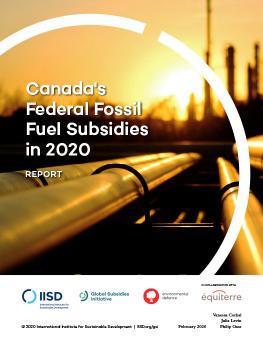
Canada's Federal Fossil Fuel Subsidies in 2020
Federal fossil fuel subsidies in Canada reached at least CAD 600 million in 2019, but more transparency is needed from government to understand the full picture.
Key Messages
- Federal fossil fuel subsidies in Canada reached at least CAD 600 million in 2019, but this figure does not include subsidies for which publicly available data was lacking, such as tax-related subsidies or potential subsidies related to the Trans Mountain pipeline and expansion.
- Subsidies have shifted from an emphasis on exploration to one on the development of infrastructure for fossil fuel production and exports (including for liquefied natural gas).
- Fossil fuel subsidies undermine climate action objectives. The Canadian government should be transparent about the full amount of fossil fuel subsidies and accelerate subsidy phase-out to meet international commitments.
Canada has announced plans to achieve net-zero emissions by 2050 but is currently not on track to meet its 2030 emissions reduction target. Meanwhile, fossil fuel subsidies undermine federal action on climate change and divert important financial resources to polluting forms of energy.
IISD identified nearly CAD 600 million in federal fossil fuel subsidies in 2019. This figure does not include figures where data was lacking, such as for tax measures or potential subsidies related to Export Development Canada and the Trans Mountain pipeline expansion.
Canada is currently undergoing a peer review of fossil fuel subsidies with Argentina as part of its G20 commitment to phase out inefficient fossil fuel subsidies by 2025. Progress on the peer review has been slow and needs a strong commitment to transparency. Canada should complete the peer review in 2020, release quantified information on all federal fossil fuel subsidies on an annual basis and commit to not introducing new fossil fuel subsidies.
Canada should also accelerate the phase-out of existing fossil fuel subsidies and develop a roadmap to meet or exceed the 2025 phase-out commitment.
We also recommend that Canada include subsidy reform as a key element of focus in the next Nationally Determined Contribution under the Paris Agreement. Fossil fuel subsidy reform would strengthen and support wider federal action on climate change and help Canada to meet its climate targets.
Participating experts
Funded by
You might also be interested in
Green Strings: Principles and conditions for a green recovery from COVID-19 in Canada
Endorsed by Canada's leading environmental groups, this paper sets out seven "green strings" recommendations to apply to government measures to ensure a green recovery from COVID-19.
Canadian Climate Groups Urge ‘Green Strings’ On COVID Recovery Funding
As Finance Minister Bill Morneau prepares to release a fiscal update today, Canada’s leading environmental organizations are calling for “green strings” on Ottawa’s COVID-19 recovery funding package.
Who Will Pay for Alberta's Orphan Wells?
Alberta's orphan wells require proper decommissioning to prevent harm to the environment and surrounding communities. Who will pay for this?
The Time is Right for New, Low-Carbon Investments
Instead of a bailout for Canada's oil and gas sector, government and industry should pursue investments that will help develop new energy solutions and markets: IISD's Richard Florizone in The Hill Times.